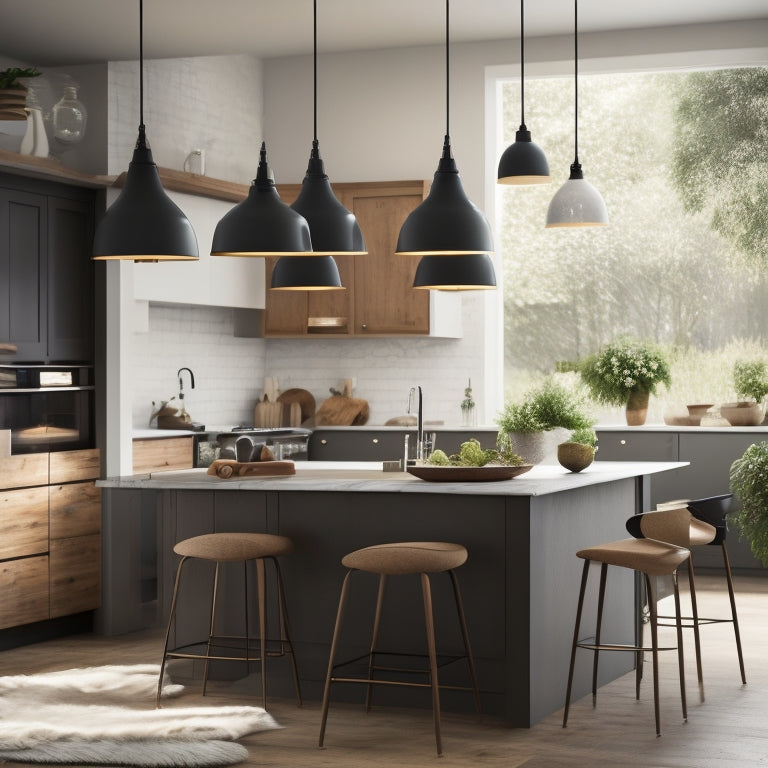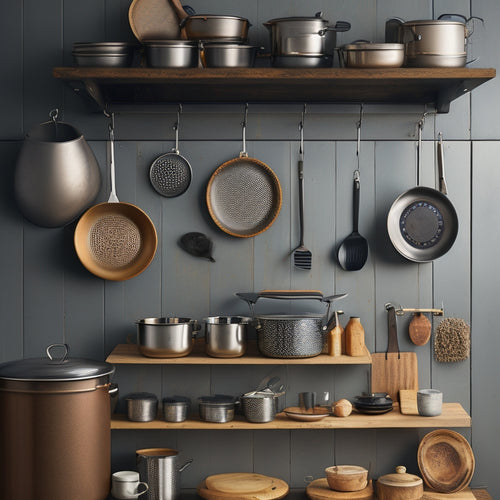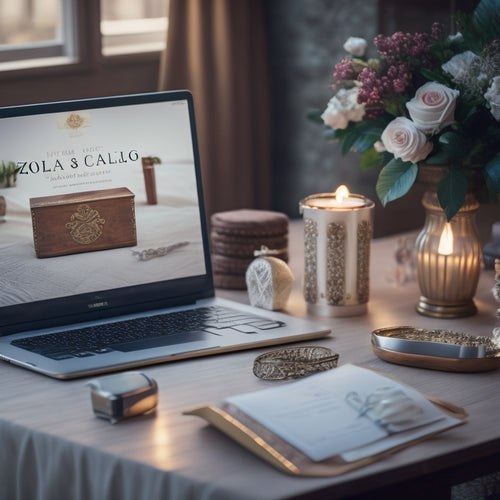
European Influence Shaping Modern Kitchen Trends
Share
European design has decisively influenced modern kitchen trends, shaping the industry's focus on clean lines, minimalism, and functional efficiency. The emphasis on innovative materials, sustainability, and ergonomic features has become paramount, driven by the pandemic-induced shift towards kitchen wellness. Manufacturers are now prioritizing green practices, minimizing waste, and incorporating eco-friendly materials into cabinet designs. As the industry continues to evolve, it's clear that European design will remain at the forefront, driving demand for sleek, contemporary aesthetics and harmonious blends of form and function. And yet, there's more to this narrative – the story of modern kitchen trends is still unfolding.
Key Takeaways
• European design dominates modern kitchen trends with its emphasis on clean lines, minimalism, and functional efficiency.
• The focus on sustainability in European kitchen design leads to the use of eco-friendly materials and responsible sourcing practices.
• The pandemic has accelerated the demand for European-inspired kitchen designs that prioritize wellness, minimalism, and adaptability.
• European manufacturers are leveraging technology to streamline production and offer personalized, high-quality, and eco-friendly kitchen solutions.
• Modern kitchens influenced by European design prioritize functionality, sustainability, and technology integration, resulting in a harmonious blend of form and function.
European Design Takes Center Stage
As the pandemic has catalyzed a shift towards home-centric living, European design has emerged as a dominant force in modern kitchen trends, characterized by its emphasis on clean lines, minimalism, and functional efficiency. It's no surprise, given the continent's reputation for innovative materials and minimalist elegance.
European kitchen furniture, in particular, has become synonymous with sleek, contemporary aesthetics that exude a sense of sophistication and refinement. The focus on clean lines and minimal ornamentation creates a sense of calm, making the kitchen feel like a serene oasis – a welcome respite from the chaos of modern life.
Functionality Meets Sustainability
European design's emphasis on functional efficiency is now being paired with a growing focus on sustainability, as manufacturers like nobilia prioritize green practices and produce high-quality cabinets that minimize waste and guarantee responsible sourcing of materials.
This shift towards eco-friendliness is a welcome change, especially in the kitchen, where functionality meets sustainability. Ergonomic storage solutions, for instance, make sure that everything has its designated place, reducing clutter and promoting a more organized cooking experience.
Meanwhile, eco-friendly materials are being incorporated into cabinet designs, making kitchens not only aesthetically pleasing but also environmentally responsible. By combining functionality with sustainability, European design is redefining the modern kitchen, creating spaces that are both beautiful and responsible.
Post-Pandemic Kitchen Evolution
The pandemic has drastically altered the way people perceive and utilize their kitchens, catalyzing a profound shift in kitchen design trends and consumer priorities.
As home cooking becomes the new normal, kitchen wellness takes center stage. With increased time spent at home, people are reevaluating their kitchen spaces, seeking functionality, and prioritizing health and wellness.
The post-pandemic kitchen evolution is all about creating a safe, efficient, and comfortable environment that accommodates the new reality of remote work, virtual learning, and social distancing. This shift has led to a surge in demand for European-inspired designs that emphasize clean lines, minimalism, and adaptability.
As a result, kitchen manufacturers are responding by incorporating sustainable materials, ergonomic features, and innovative storage solutions to meet the evolving needs of homeowners.
Shifting Kitchen Industry Landscape
Beyond the consumer-driven demand for functional and sustainable kitchens, a significant transformation is underway in the kitchen industry's manufacturing and supply chain dynamics. The digital transformation is reshaping the industry, with manufacturers leveraging technology to streamline production, reduce waste, and improve quality. This shift is driven by changing consumer behavior, as homeowners increasingly expect personalized, high-quality, and eco-friendly kitchen solutions.
| Trend | Driver | Impact |
|---|---|---|
| Digital Transformation | Consumer demand for personalized kitchens | Improved manufacturing efficiency, reduced waste |
| Supply Chain Optimization | Need for faster, more reliable delivery | Increased customer satisfaction, reduced costs |
| Sustainable Manufacturing | Growing concern for environmental impact | Reduced carbon footprint, increased brand reputation |
| Data-Driven Design | Rise of smart kitchens and connected devices | Enhanced customer experience, improved product development |
Modern Kitchen Must-Haves
As consumers increasingly expect personalized, high-quality, and eco-friendly kitchen solutions, modern kitchen must-haves have evolved to prioritize functionality, sustainability, and seamless integration of technology. Gone are the days of cluttered countertops and outdated designs.
Today's kitchens demand innovative appliances that make cooking and cleaning a breeze, paired with sleek finishes that exude sophistication. Europeans have long mastered the art of efficient kitchen design, and their influence is evident in the modern kitchen's focus on minimalism and adaptability.
With wellness and sustainability at the forefront of kitchen design, modern homeowners can expect a harmonious blend of form and function that not only impresses but also prioritizes their safety and well-being.
Frequently Asked Questions
How Can I Incorporate European Style Into My Small Kitchen Design?
To incorporate European style into your small kitchen design, opt for Minimalist Chic elements like clean lines, simple colors, and Space Savvy solutions, such as wall-mounted shelves and multi-functional appliances, to create a functional and sleek space that exudes sophistication.
Are European Kitchen Cabinets More Expensive Than Traditional Ones?
"Generally, European kitchen cabinets are pricier due to luxury brands and high-end materials, but this premium cost translates to superior quality, durability, and sleek designs, ultimately justifying the investment for safety-conscious homeowners seeking long-term value."
Can European Kitchen Furniture Be Customized for Unique Spaces?
Customized solutions for unique spaces are a hallmark of European kitchen furniture, offering space optimization through flexible and movable designs that cater to individual needs, ensuring a seamless blend of form and function.
What Are the Benefits of Using Sustainable Forest Practices in Kitchen Design?
When prioritizing sustainable forest practices in kitchen design, benefits include minimizing environmental harm, ensuring responsible wood sourcing, and earning eco-friendly credentials, ultimately resulting in a carbon offset that promotes a safer, healthier living space.
How Do I Balance Functionality and Aesthetics in My Kitchen Design?
Can a kitchen truly be functional without sacrificing style? Balancing aesthetics and functionality in kitchen design requires careful space planning, incorporating your personal style through intentional choices, and prioritizing ergonomic considerations to create a harmonious and safe space.
Related Posts
-

7 Essential Tips for Pot and Pan Storage
You're tired of digging through a cluttered kitchen for the right pot or pan, and frustrated with the scratches and d...
-

Newlyweds' Zola Registry: Top Picks Unveiled
Newlyweds can now effortlessly create their dream home with Zola's expertly curated registry picks. For a warm and in...

